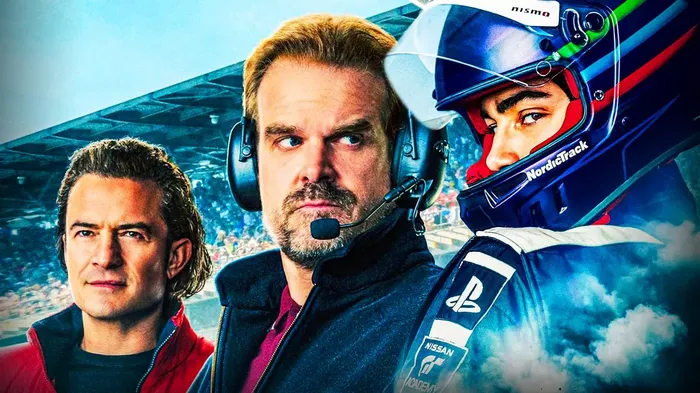A Biopic in Dispute: Unraveling the Dichotomy
Conflicting tides of appraisal surge around Neill Blomkamp’s cinematic rendition of Gran Turismo, revealing an intricate tug of war between critics and audience evaluations. The silver screen chronicle delves into the veritable odyssey of Jann Mardenborough, an adolescent virtuoso who wove a trajectory from virtual racing to the echelons of professional motorsport via the GT Academy. Infused with the talents of Archie Madekwe in the role of Mardenborough, with David Harbour and Orlando Bloom adorning pivotal characters, the film orchestrates a symphony where biographical realism harmonizes with the cadence of an underdog tale, all bound within the contours of a gaming narrative.
Verdict Divergence: A Tale of Contrasting Rotten Tomatoes Scores
Within the labyrinthine corridors of Rotten Tomatoes, a schism comes to light, casting critics and audiences in opposing roles of adjudication. The upcoming Gran Turismo adorns its profile with an audience score that flirts with perfection, an impressive 98 percent gleaned from a resounding chorus of over 250 audience reviews. However, a dissonant note emerges from the realm of critics, striking a chord of skepticism with a 58 percent consensus based on 99 critiques at the juncture of this analysis.
Unraveling the Score Disparity: A Multitude of Threads
The origin of this divergence may nest within the contours of its target demographic. Gran Turismo, hailing from its 1997 genesis, has unfurled across multiple standard and commemorative editions, cultivating its legacy as one of PlayStation’s most illustrious and lucrative franchises. In this celluloid incarnation, Gran Turismo diligently mirrors the pulse of the game, fashioning a cinematic racetrack adorned with the gleam of special effects. This emulation transcends mere mimicry, elevating the sensory experience beyond the traditional confines of action cinema.
A luminous facet underpinning this polarized reception could be attributed to David Harbour’s enigmatic charisma. Familiar to aficionados of action entertainment, Harbour’s name resonates through a diverse litany of appearances, traversing the terrains of Stranger Things, Black Widow, and Hellboy. Harbour’s inclusion serves as a gravitational force that magnetizes success, his embodiment of yet another authoritative persona echoing past feats, thus eliciting parallelism and inevitably securing the favor of the populace.
Crafting Unity Amidst Dissonance: Gaming Nostalgia and Escapism
While the scaffold of gaming homages and the comforting cadence of heartwarming narrative conventions may not find kinship in the realm of critics, their resonance bears testament to the parallel universe that is Gran Turismo. The celluloid adaptation orchestrates harmonies of underdog sagas, chords that resonate not solely with game devotees but also with those embracing escapism during the summer symphony of blockbusters.
In the grand tapestry of Gran Turismo’s reception, one finds an intricate weave of factors, an interplay of cinematic vision, performer charisma, and narrative undertones. As the film navigates the duality of critical and audience acknowledgment, it weaves a saga beyond the confines of the screen, bridging virtual realms with the tangible arena of cinematic appreciation.
RELEATED READING:
-
Jon Hamm Revives Boba Fett in Star Wars Universe Amidst Return of the Jedi Commemoration
-
Good Burger 2 Teaser Unveils Dex and Ed’s Long-Awaited Reconnection Amidst Unpredictable Escapades
-
Decoding “FUBAR” in Saving Private Ryan: Historical Accuracy and Cinematic Impact

